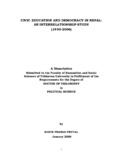Please use this identifier to cite or link to this item:
https://elibrary.tucl.edu.np/handle/123456789/1990| Title: | Civic Education and Democracy in Nepal |
| Other Titles: | An Interrelationship Study |
| Authors: | PHUYAL, BIDUR PRASAD |
| Keywords: | Democracy;Education Systems;Political Systems |
| Issue Date: | Jan-2009 |
| Publisher: | Faculty of Humanities and Social Sciences of Tribhuvan University |
| Abstract: | This study has been carried out aiming at determining the interrelationship between democracy and civic education, the space civic education was given in the Nepalese education system, and the relationship between civic education and the process of democratization of the Nepalese political system. The study was based on the assumption that for emancipation of individuals, the main task of civic education should be to make people aware of the causes of social problems and prepare them to fight back those problems. In line with his, civic education should lead the people to take actions for transformation of the society. The study is also based on the reproduction theory in the sense that the people who were governed the country were the ones who controlled education and they all were doing things to reproduce and continue what they believed useful for the country as well as for them. This study has been designed to look into the relationships between civic education and the process of democratization of the Nepali politics gaining insights from the above theoretical considerations. Adopting historical approach to research for the development of the methodology of the study, significant political theories were reviewed and relevant political and educational events that took place in the past were critically examined. Empirical information was collected through interviews with academicians, politicians, educationists, teachers, and students, and classroom observations of the delivery of civic education. The information gathered through theoretical assumptions was analyze and interpreted by using the interpretative theory practiced in social science. Similarly, empirical data were collected from individuals (interviewees) and institutions (classrooms) regarding the nature and ways of imparting civic education, and the political development of Nepal and the contribution of civic education to the process of democratization of Nepali polity. The study reveals that the political system of a country, democracy, education system, and civic education are correlated concepts. It was also revealed that civic education in Nepal received comparatively better position when the political system was democratic, and when it was undemocratic, the space of civic education was downgraded. A weak link was found between formal civic education and the process of 8 democratization of the Nepali politics. The implication was that there was need for integration of proper contents of civic education and effective delivery systems for making civic education contributory to the process of democratization of the political system of the country. Nepal was found to have partially followed the international trends while examining the Nepal trends of delivery of civic education against the international trends; Nepali’s delivery of civic education involved only conceptualization of civic knowledge, teaching civic education contents as a separate curriculum under a formal setting, and active learning of civic knowledge, skills and virtues. Thus Nepal’s civic education was at rudimentary stage in terms of status, content coverage, delivery process and contribution to the process of democratization of the political system of the country. The implication is that in order for civic education to support the democracy in the country, there is need for simultaneous development in the infrastructural development for and delivery of civic education. In addition, strengthening institutional process of democracy and a provision for effective delivery of civic education are also necessary. The thesis could be condensed by saying that no country would be able to promote democratic process in absence of civic education, in turn; no civic education would be meaningful in absence of democratic process. |
| URI: | http://elibrary.tucl.edu.np/handle/123456789/1990 |
| Appears in Collections: | Political Science |
Files in This Item:
| File | Description | Size | Format | |
|---|---|---|---|---|
| 4235 (2).pdf | 2.6 MB | Adobe PDF |  View/Open |
Items in DSpace are protected by copyright, with all rights reserved, unless otherwise indicated.
